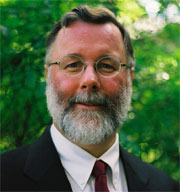 |
| Pediatric anesthesiologist Allen Finley. |
The American Pain Society (APS) recently honoured Halifax pain researcher and physician Allen Finley for his global efforts to end childrenās pain. The society presented Dr. Finley with the Jeffrey Lawson Award for Advocacy in Childrenās Pain Relief at its annual meeting in Tampa, Florida in May.
āDuring his career, Allen Finley has been a passionate advocate for effective care for children with acute and chronic pain,ā said APS President Judith Paice, PhD, RN. āHis achievements deserve our recognition.ā
A pediatric anesthesiologist at the IWK Health Centre and professor at pilipiliĀž» Medical School, Dr. Finley has worked for years to spread the message that childrenās pain is real, that it matters, and that it can be measured and treated. āMany people used to think babies and young children donāt feel pain as much as older children and adults,ā explains Dr. Finley. āNow we know that even the youngest children feel pain just as intensely as anyone else; adults just havenāt known how to identify or assess their pain.ā
Over the past 15 years, Dr. Finley has published more than 80 papers in peer-reviewed journals, co-written textbooks now available in at least a dozen languages, and delivered some 160 lectures on childhood pain, on six continents. He founded the PEDIATRIC-PAIN e-mail discussion forum, bringing together pain researchers and clinicians from 40 over countries. As current president of the International Association for the Study of Painās āSpecial Interest Group on Pain in Childhood,ā he has mobilized colleagues around the world to address childrenās pain in developing nations.
āChildrenās pain is a huge challenge around the world,ā Dr. Finley says, in part because 80 per cent of the worldās children live in developing nations, where they are subject to the same pains as children in wealthier nations, plus pain from malaria, HIV/AIDS, late diagnosis of cancer, and injuries caused by war, terrorism and natural disasters. āRegardless of location or cause, untreated childhood pain can hinder development, alter the nervous system, and raise the risk of chronic pain later in life,ā he says.
Dr. Finley has worked with hospitals across Canada and around the world to set up pediatric pain management programs ā most recently in a childrenās cancer unit in Amman, Jordan. Now he is working with Khon Kaen University to study how childrenās pain is understood and managed in rural Thailand, with a $960,000 Teasdale-Corti Team Grant from the Global Health Research Initiative Program. āWe will develop, implement, test and refine new pain management policies and professional education programs,ā says Dr. Finley, who is planning similar projects with colleagues in China and Brazil. āMy focus is on developing clinical services and the professional expertise and capacity to sustain them.ā
